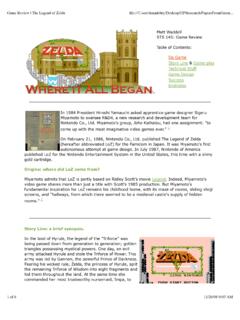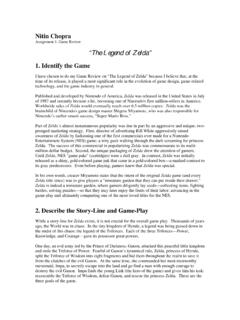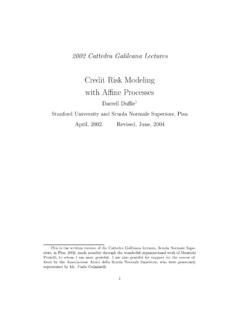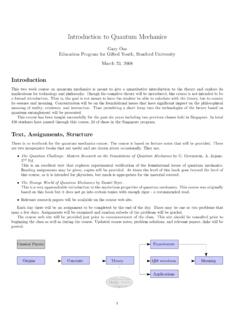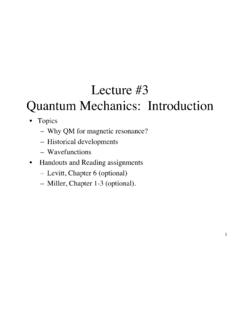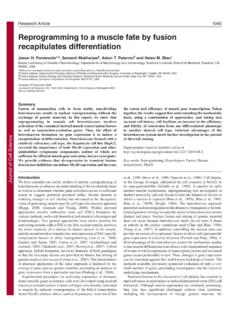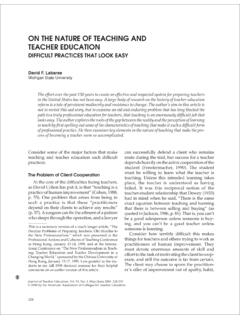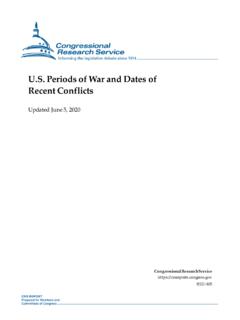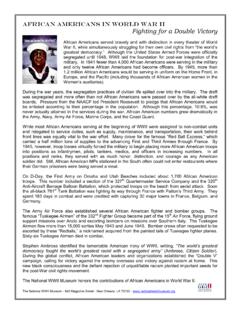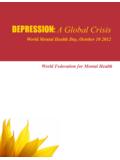Transcription of The Reasons for Wars – an Updated Survey
1 The Reasons for wars an Updated Survey Matthew O. Jackson and Massimo Morelli Revised: December 2009 Forthcoming in the Handbook on the Political Economy of War, edited by Chris Coyne, Elgar Publishing We thank CEPR for allowing us to organize a workshop on conflict in Switzerland in the months before the deadline for this chapter. We also thank Bob Powell and Stergios Skaperdas for helpful comments on earlier drafts. Matthew O. Jackson: Department of Economics, Stanford University, Stanford, California 94305-6072, and external faculty member of the Santa Fe Institute, USA. Email: ~jacksonm Massimo Morelli: Columbia University and European University Institute. Email: 21. Introduction Why do wars occur and recur, especially in cases when the decisions involved are made by careful and rational actors?
2 There are many answers to this question. Given the importance of the question, and the wide range of answers, it is essential to have a perspective on the various sources of conflict. In this chapter we provide a critical overview of the theory of war. In particular, we provide not just a taxonomy of causes of conflict, but also some insight into the necessity of and interrelation between different factors that lead to war. Let us offer a brief preview of the way in which we categorize causes of war. There are two prerequisites for a war between (rational) actors. One is that the costs of war cannot be overwhelmingly high. By that we mean that there must be some plausible situations in the eyes of the decision makers such that the anticipated gains from a war in terms of resources, power, glory, territory, and so forth exceed the expected costs of conflict, including expected damages to property and life.
3 Thus, for war to occur with rational actors, at least one of the sides involved has to expect that the gains from the conflict will outweigh the costs incurred. Without this prerequisite there can be lasting Second, as cogently argued by Fearon (1995), there has to be a failure in bargaining, so that for some reason there is an inability to reach a mutually advantageous and enforceable agreement. The main tasks in understanding war between rational actors are thus to see why bargaining fails and what incentives or circumstances might lead countries to arm in ways such that the expected benefits from war outweigh the costs for at least one of the sides. A good portion of our overview of the causes of war is thus spent discussing a framework of different bargaining failures.
4 We emphasize that understanding sources of bargaining failure is not only useful as a categorization, but also because different types of failures lead to different conclusions about the types of wars that emerge, and particularly about things like the duration of war. We return to comment on this after 1 See Meirowitz and Sartori (2008) and Jackson and Morelli (2009) for the point that this is true even when armament decisions are endogenous, a subject that we discuss below. 3discussing various Reasons for bargaining failure. Below, we talk in detail about the following five Reasons for bargaining failure:2 1. Asymmetric information about the potential costs and benefits of war.
5 2. A lack of ability to enforce a bargaining agreement and/or a lack of the ability to credibly commit to abide by an agreement. 3. Indivisibilities of resources that might change hands in a war, so that not all potentially mutually beneficial bargaining agreements are feasible. 4. Agency problems, where the incentives of leaders differ from those of the populations that they represent. 5. Multilateral interactions where every potential agreement is blocked by some coalition of states or constituencies who can derail it. To illustrate the importance of understanding which reason lies behind a conflict, note that if there is a lack of ability to enforce or commit to an agreement, then a war may last a long time.
6 It will last until either one side has emerged victorious, or the situation has changed so that the costs of continued conflict have become overwhelmingly high for all sides. Such a lack of enforceable agreements is often one of the main ingredients leading to protracted wars . In contrast, suppose that enforceable and credible agreements are possible, but that the states start with asymmetric information, for instance, about the relative strength of one of the two countries. In such a case, there can be a bargaining failure which leads to war. However, in such a setting once war really begins the relative strengths of the countries can become clearer, and given that credible bargaining is possible and can avoid further costs of war the states could then reach an agreement to end the war.
7 So, different durations of wars can correspond to different sources of bargaining failures. We expand on this below. The chapter is organized as follows: For a clearer understanding of the boundaries of rationalist versus non rationalist explanations, we start by briefly discussing non- 2 This expands on the list of Fearon (1995), which included the first 3 elements. 4rationalist explanations in section 2. Section 3 provides a taxonomy of bargaining failures and how these relate to conflict; section 4 contains a discussion of which theories described in section 3 shed light on the observations of the democratic peace. In section 5 we report on the state of the literature on endogenous armaments and power and the implications for conflict and war.
8 2. The realm of rationality Before proceeding to discuss various bargaining failures as causes of war, we discuss some of the alternative sources of conflict that are sometimes thought to fall into the realm of irrationality. We argue that many of these are more usefully viewed as being rational in nature, and hence the bargaining failure categorization still applies to many conflicts that are sometimes thought to be irrational. In order for our discussion to be as unambiguous as possible, we begin by clarifying what we mean when we dichotomize between rational and irrational actors. When we refer to a rational action by an agent we require that action to maximize the expected payoff to that agent out of the available actions and relative to the agent s beliefs about the potential consequences of the actions.
9 This does not necessarily require that the beliefs be accurate, nor that the payoffs of the individual agent correspond to what is best for the state or country that he or she might This is a broader definition of a rationalist explanation than is usually understood in International Relations, where it is common to associate a rationalist approach to realist and neo-realist theories of conflict with unitary actors that are exclusively interested in material costs and benefits. Our broader definition should make it clear that what matters is that players, given the payoffs that they face from different outcomes, choose their actions to maximize it given their beliefs about the opponents actions, hence the qualification "material costs and benefits" is not necessary, nor it is necessary to confine the use of the rationalist approach to the world of unitary actors.
10 3 In order for this not to become a tautology, one has to be careful. An "irrational" act can always be rationalized simply by saying that it gave the agent taking it a high payoff for some intrinsic reason. Thus in order to have bite, the payoffs to agents for various actions have to have some natural specification. Although the distinction is thus partly semantic, or reliant on some idea of what natural payoffs should be, we still find it to be a useful dichotomy. 5 With this viewpoint in mind, let us discuss some causes of war that are often thought of as relying on some level of ``irrationality. As we shall see, with our broad definition of rationality, even many of these may be interpreted as rational causes of war.

